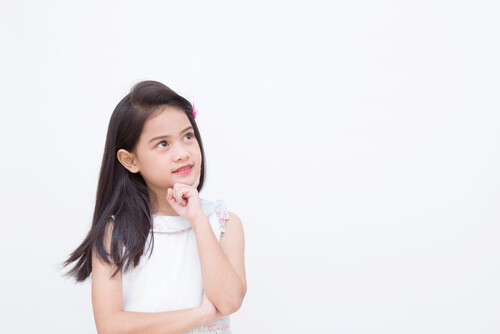The Characteristics of Pre-operative Thought According to Piaget


Written and verified by lawyer Francisco María García
Piaget understood that the structures of thought and behavior in children are different than those of adults. Each stage of development possesses its own ways of thinking, reasoning, acting and feeling. It’s important that we take these differences into account in order to accompany children in their developmental processes.
Why is this information so important? It helps us understand how young children think and reason. This, in turn, helps us educate children in a coherent and effective way, based on our knowledge of how they think and reason.
Pre-operative thought according to Piaget
Children go through the stage of pre-operative thought between the ages of 2 and 7, approximately. Prior to this, they go through the sensorimotor stage, which starts at birth and extends through the first 2 years of life.
“If you want to be creative, stay in part a child, with the creativity and invention that characterizes children before they are deformed by adult society”
–Jean Piaget–
What are the characteristics of pre-operative thought?
The following are the characteristics of pre-operative thought:
- The appearance of language, which conditions all mental structures.
- The ability to speak enables a different mental structure, in which symbolic function is fundamental. The child uses symbols to represent objects, places and people. Children understand that words are used to name the things in their environment.
- Children form their identity, despite the changes that their bodies experience. They recognize themselves, even as they grow and change. The same occurs in regards to their mothers, fathers, siblings, etc. They identify them as who they are, even if their appearance changes.
- Little by little, children acquire the capacity to put themselves in other people’s shoes. Role-playing games allow them to take on the roles of other people they know. For example, they may imitate their mother or father doing household tasks.
- Egocentrism is very present during this stage. Children in this stage still manage the world from an egocentric perspective. In other words, they think the world exists for their own use. This makes abstract thinking very difficult.

Abstract thought starts to appear through socialization. Children in this stage generally play on their own, even if they share space and toys with their peers. Many parents worry about this characteristic.
A common phrase during this time period is “you have to share.” But it’s natural for children to want all the toys for themselves at this age.
The formation of concepts and questions
- Animism is another characteristic of pre-operative thought. Children in this stage attribute intentionality to everything and, therefore, all things are animate. Objects are bad because they fall, the moon is good because it lights up the night, etc.
- The world is explained with magical realism. These children create simple explanations of everything that occurs around them. Their thoughts are based on simple associations.
- Pre-operative thought functions by analogy, establishing comparative relationships between data. Children in the pre-operative stage look for similarities and differences to make conclusions. Their thought is not logical.
- The child is forming concepts, and isn’t concerned with discovering if something is true or false. For example, a child sees her mother cleaning the house before guests come over. From then on, the child thinks guests are coming any time she sees her mother cleaning.

- This is the “why” stage. Children are coming to discover the world through adults, and asking “why” provides them with answers. The questions they ask reveal the characteristics of their magical thought.
- The child may ask about simple, everyday things, or more complex and transcendent issues – like death or sexuality. Sometimes a good strategy is to return the question, asking “well, what do you think?” This forces the child to think, create a hypothesis and use his thought to come up with a response.
- The irreversibility of the child’s thought doesn’t allow him to conceive two categories in one. For example, his mother can’t be his grandma’s daughter, because she’s a mother.
According to Piaget, individual differences influence the way that children think during the pre-operative stage. Different characteristics will be stronger in one child than in the next.
The end of this stage coincides with the acquiring of basic learning skills. In other words, the beginning of concrete operations.
Piaget understood that the structures of thought and behavior in children are different than those of adults. Each stage of development possesses its own ways of thinking, reasoning, acting and feeling. It’s important that we take these differences into account in order to accompany children in their developmental processes.
Why is this information so important? It helps us understand how young children think and reason. This, in turn, helps us educate children in a coherent and effective way, based on our knowledge of how they think and reason.
Pre-operative thought according to Piaget
Children go through the stage of pre-operative thought between the ages of 2 and 7, approximately. Prior to this, they go through the sensorimotor stage, which starts at birth and extends through the first 2 years of life.
“If you want to be creative, stay in part a child, with the creativity and invention that characterizes children before they are deformed by adult society”
–Jean Piaget–
What are the characteristics of pre-operative thought?
The following are the characteristics of pre-operative thought:
- The appearance of language, which conditions all mental structures.
- The ability to speak enables a different mental structure, in which symbolic function is fundamental. The child uses symbols to represent objects, places and people. Children understand that words are used to name the things in their environment.
- Children form their identity, despite the changes that their bodies experience. They recognize themselves, even as they grow and change. The same occurs in regards to their mothers, fathers, siblings, etc. They identify them as who they are, even if their appearance changes.
- Little by little, children acquire the capacity to put themselves in other people’s shoes. Role-playing games allow them to take on the roles of other people they know. For example, they may imitate their mother or father doing household tasks.
- Egocentrism is very present during this stage. Children in this stage still manage the world from an egocentric perspective. In other words, they think the world exists for their own use. This makes abstract thinking very difficult.

Abstract thought starts to appear through socialization. Children in this stage generally play on their own, even if they share space and toys with their peers. Many parents worry about this characteristic.
A common phrase during this time period is “you have to share.” But it’s natural for children to want all the toys for themselves at this age.
The formation of concepts and questions
- Animism is another characteristic of pre-operative thought. Children in this stage attribute intentionality to everything and, therefore, all things are animate. Objects are bad because they fall, the moon is good because it lights up the night, etc.
- The world is explained with magical realism. These children create simple explanations of everything that occurs around them. Their thoughts are based on simple associations.
- Pre-operative thought functions by analogy, establishing comparative relationships between data. Children in the pre-operative stage look for similarities and differences to make conclusions. Their thought is not logical.
- The child is forming concepts, and isn’t concerned with discovering if something is true or false. For example, a child sees her mother cleaning the house before guests come over. From then on, the child thinks guests are coming any time she sees her mother cleaning.

- This is the “why” stage. Children are coming to discover the world through adults, and asking “why” provides them with answers. The questions they ask reveal the characteristics of their magical thought.
- The child may ask about simple, everyday things, or more complex and transcendent issues – like death or sexuality. Sometimes a good strategy is to return the question, asking “well, what do you think?” This forces the child to think, create a hypothesis and use his thought to come up with a response.
- The irreversibility of the child’s thought doesn’t allow him to conceive two categories in one. For example, his mother can’t be his grandma’s daughter, because she’s a mother.
According to Piaget, individual differences influence the way that children think during the pre-operative stage. Different characteristics will be stronger in one child than in the next.
The end of this stage coincides with the acquiring of basic learning skills. In other words, the beginning of concrete operations.
All cited sources were thoroughly reviewed by our team to ensure their quality, reliability, currency, and validity. The bibliography of this article was considered reliable and of academic or scientific accuracy.
- Berger, K. S. (2007). Psicología del desarrollo: infancia y adolescencia. Ed. Médica Panamericana.
- Cano De Faroh, A. (2007). Cognición en el adolescente según Piaget y Vygotski. ¿ Dos caras de la misma moneda? Boletim Academia Paulista de Psicologia.
- de los Heros, M. A. (2010). Aportes de Jean Piaget a la teoría del conocimiento infantil. Temática Psicológica, (6), 15-19. https://revistas.unife.edu.pe/index.php/tematicapsicologica/article/view/857/768
- Gaete, V. (2015). Desarrollo psicosocial del adolescente. Revista chilena de pediatría, 86(6), 436-443. https://scielo.conicyt.cl/scielo.php?pid=S0370-41062015000600010&script=sci_arttext&tlng=en
- Hidalgo Jaramillo, M. P. (2015). Proyecto APP Titirivon. Manual de uso para padres (Bachelor’s thesis, Universidad Casa Grande. Facultad Mónica Herrera). http://dspace.casagrande.edu.ec:8080/bitstream/ucasagrande/534/1/Tesis815HIDm.pdf
- Linares, A. (2007). Desarrollo cognitivo: Las teorías de Piaget y de Vygotsky. Col-legi Oficial de Psicólegs de Catalunya.
- Piaget, J. (1980). Teoría del desarrollo cognitivo de Piaget. Creative Commons Attribution-Share Alike.
This text is provided for informational purposes only and does not replace consultation with a professional. If in doubt, consult your specialist.








